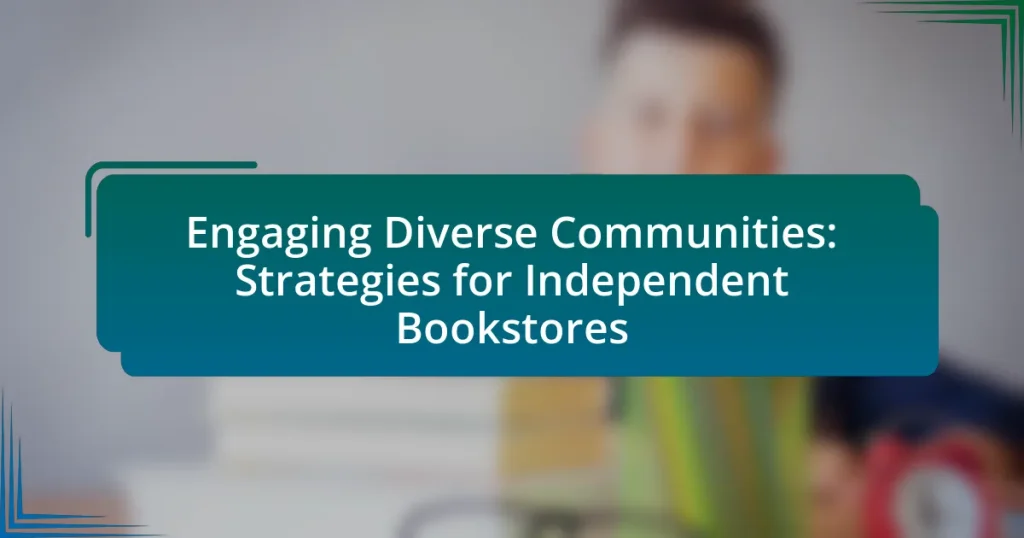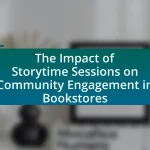The article focuses on strategies for independent bookstores to engage diverse communities effectively. Key strategies include hosting culturally relevant events, curating diverse book selections, and forming partnerships with local organizations. It discusses methods for identifying community demographics, leveraging local partnerships, and creating inclusive events that resonate with various cultural backgrounds. Additionally, the article addresses challenges independent bookstores face, such as limited resources and competition, while highlighting the financial benefits of community engagement and best practices for sustained relationships with diverse populations.
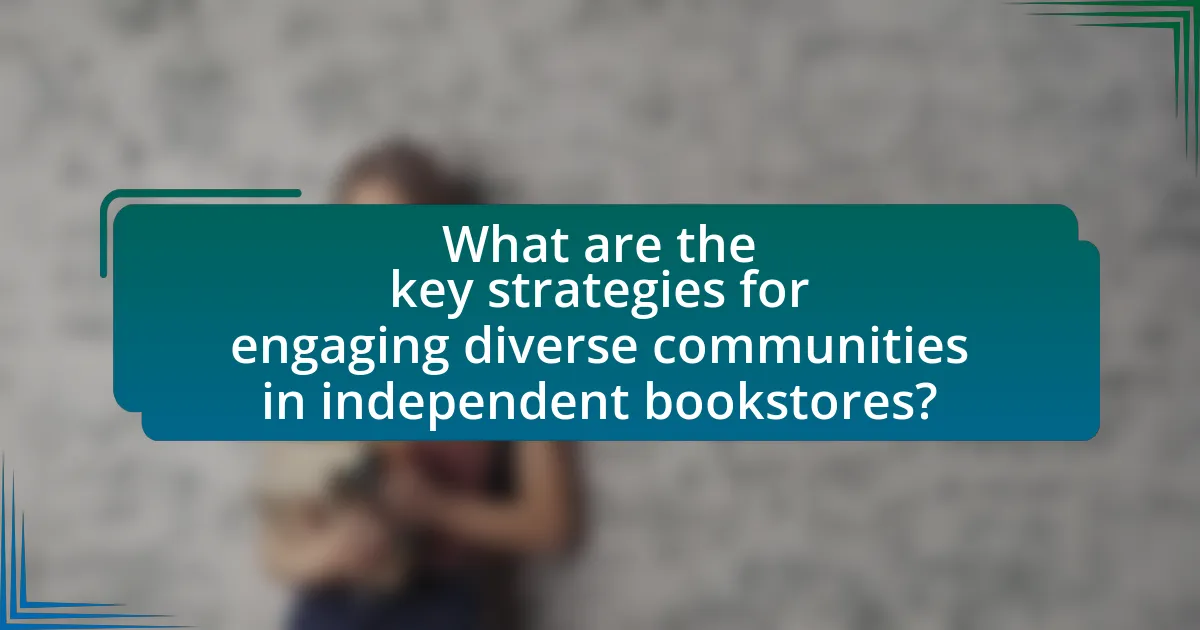
What are the key strategies for engaging diverse communities in independent bookstores?
Key strategies for engaging diverse communities in independent bookstores include hosting culturally relevant events, curating diverse book selections, and fostering partnerships with local organizations. Culturally relevant events, such as author readings, workshops, and community discussions, create a welcoming environment that resonates with various cultural backgrounds. Curating diverse book selections ensures representation and accessibility, which can attract a broader audience. Additionally, partnerships with local schools, cultural organizations, and community groups can enhance outreach efforts and build trust within diverse communities. These strategies are supported by research indicating that inclusive programming and representation in literature significantly increase community engagement and customer loyalty in independent bookstores.
How can independent bookstores identify diverse communities in their area?
Independent bookstores can identify diverse communities in their area by analyzing demographic data and engaging with local organizations. Utilizing resources such as the U.S. Census Bureau, bookstores can access detailed demographic information, including ethnicity, language, and income levels, which helps in understanding the community’s composition. Additionally, collaborating with local cultural organizations, schools, and community centers allows bookstores to gain insights into the specific needs and interests of diverse groups. This approach not only informs inventory decisions but also fosters relationships that enhance community engagement.
What methods can be used to research community demographics?
Surveys and census data are effective methods to research community demographics. Surveys can be conducted through questionnaires distributed to community members, gathering information on age, ethnicity, income, and education levels. Census data, collected by government agencies, provides comprehensive demographic statistics, including population size and distribution, which can be analyzed to understand community characteristics. Additionally, focus groups and interviews can offer qualitative insights into community needs and preferences, complementing quantitative data from surveys and census reports. These methods collectively enable a detailed understanding of community demographics, essential for independent bookstores aiming to engage diverse populations.
How can bookstores leverage local partnerships to understand community needs?
Bookstores can leverage local partnerships by collaborating with community organizations, schools, and local businesses to gain insights into community needs. These partnerships facilitate information exchange, allowing bookstores to understand local interests, demographics, and cultural dynamics. For instance, partnering with schools can provide bookstores with feedback on popular genres among students, while collaborations with local nonprofits can highlight social issues that resonate within the community. This approach not only enhances the bookstore’s inventory and programming but also fosters a sense of belonging and relevance within the community, ultimately driving customer loyalty and engagement.
What role does community involvement play in bookstore engagement?
Community involvement significantly enhances bookstore engagement by fostering relationships between the bookstore and local residents. When bookstores actively participate in community events, host local authors, or collaborate with schools and organizations, they create a sense of belonging and loyalty among customers. Research indicates that bookstores that engage with their communities see increased foot traffic and sales, as they become cultural hubs that reflect local interests and values. For instance, a study by the American Booksellers Association found that independent bookstores that host community events report a 30% increase in customer engagement compared to those that do not. This involvement not only drives sales but also strengthens the bookstore’s role as a vital part of the community fabric.
How can independent bookstores create inclusive events that attract diverse audiences?
Independent bookstores can create inclusive events that attract diverse audiences by actively engaging with various community groups and tailoring events to their interests. This involves collaborating with local organizations, schools, and cultural groups to understand their needs and preferences, ensuring representation in event planning. For instance, hosting multilingual book readings or author discussions that reflect the community’s demographics can foster inclusivity. Research indicates that events designed with input from diverse community members see higher participation rates, as they resonate more with the audience’s cultural backgrounds and interests. By prioritizing accessibility, such as providing materials in multiple languages and ensuring physical accessibility, independent bookstores can further enhance participation from underrepresented groups.
What are effective ways to collaborate with local organizations and schools?
Effective ways to collaborate with local organizations and schools include establishing partnerships through joint events, sharing resources, and creating programs that benefit both parties. For instance, independent bookstores can host reading programs or author visits in collaboration with schools, which fosters a love for reading among students while promoting the bookstore. Additionally, bookstores can work with local organizations to sponsor community events, enhancing visibility and community engagement. Research shows that such collaborations can increase community support and drive foot traffic, as evidenced by a study from the American Booksellers Association, which found that bookstores involved in community initiatives saw a 30% increase in customer engagement.
How can marketing strategies be tailored to reach diverse communities?
Marketing strategies can be tailored to reach diverse communities by incorporating culturally relevant messaging and utilizing targeted outreach methods. For instance, independent bookstores can analyze demographic data to understand the specific needs and preferences of various communities, allowing them to create promotional materials that resonate with those audiences. Research indicates that 67% of consumers prefer brands that reflect their cultural values, highlighting the importance of cultural alignment in marketing efforts. Additionally, engaging with community leaders and participating in local events can enhance visibility and foster trust, further solidifying relationships with diverse groups.
What types of promotional materials resonate with different cultural groups?
Promotional materials that resonate with different cultural groups include culturally relevant imagery, language-specific content, and community-focused messaging. For instance, materials featuring diverse representations and symbols can enhance relatability for specific ethnic groups, while bilingual or multilingual content caters to non-English speaking populations, fostering inclusivity. Additionally, promotional strategies that highlight community events or local authors can strengthen connections with cultural communities. Research indicates that culturally tailored marketing increases engagement; for example, a study by the American Marketing Association found that 64% of consumers are more likely to purchase from brands that reflect their cultural values.
How can social media be utilized to engage with diverse audiences?
Social media can be utilized to engage with diverse audiences by creating tailored content that resonates with various cultural backgrounds and interests. Independent bookstores can leverage platforms like Instagram, Facebook, and Twitter to share multilingual posts, highlight diverse authors, and promote events that celebrate different cultures. For instance, a study by the Pew Research Center found that 69% of adults in the U.S. use social media, making it a vital tool for reaching a broad demographic. By actively engaging with community feedback and utilizing targeted advertising, bookstores can foster inclusivity and build a loyal customer base across diverse groups.
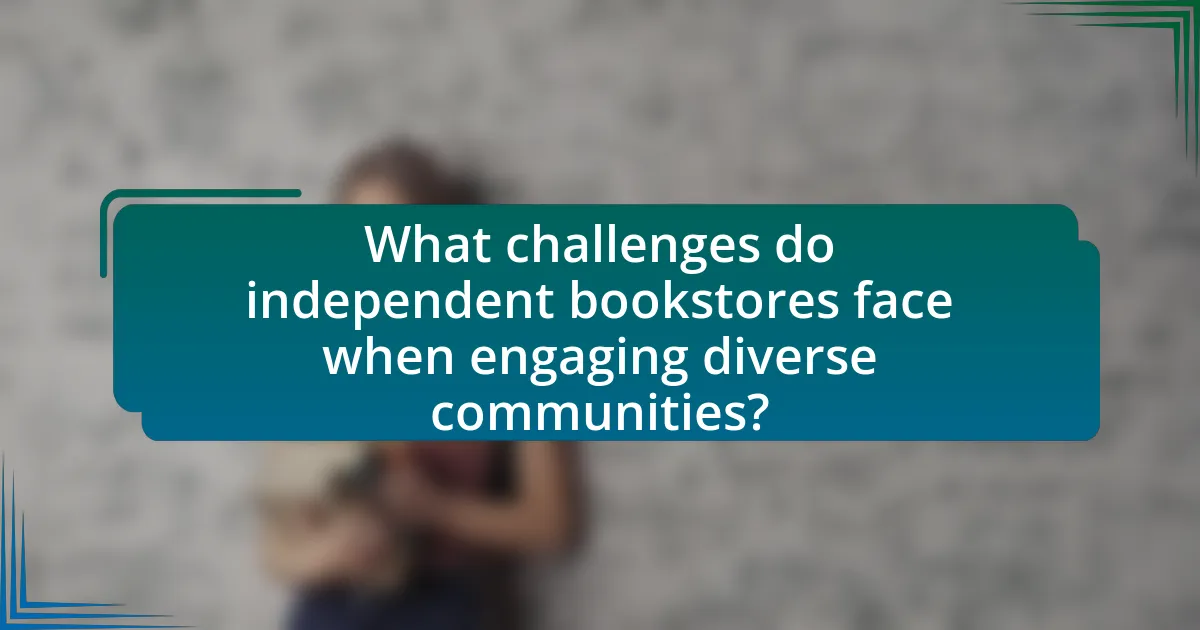
What challenges do independent bookstores face when engaging diverse communities?
Independent bookstores face several challenges when engaging diverse communities, primarily including limited resources, cultural misunderstandings, and competition from larger retailers. Limited resources restrict their ability to stock diverse titles that reflect the interests of various communities, which can hinder outreach efforts. Cultural misunderstandings may arise from a lack of representation among staff, leading to misalignment with community needs and preferences. Additionally, competition from larger retailers, which often have more extensive marketing budgets and inventory, makes it difficult for independent bookstores to attract diverse customers. These challenges collectively impact the effectiveness of independent bookstores in fostering inclusive environments and building relationships with diverse communities.
How can independent bookstores overcome language barriers?
Independent bookstores can overcome language barriers by offering multilingual book selections and employing staff who are fluent in various languages. By curating a diverse inventory that includes books in different languages, bookstores can cater to a broader audience, enhancing accessibility for non-English speakers. Additionally, hiring bilingual staff not only facilitates communication but also fosters a welcoming environment for diverse communities. Research indicates that businesses that embrace multilingualism can increase customer satisfaction and loyalty, as seen in studies showing that 72% of consumers prefer to purchase products in their native language.
What resources are available for translation and multilingual marketing?
Resources available for translation and multilingual marketing include professional translation services, localization software, and multilingual marketing platforms. Professional translation services, such as TransPerfect and Lionbridge, provide expert translators who ensure accurate and culturally relevant translations. Localization software like SDL Trados and Memsource helps streamline the translation process, allowing businesses to manage multilingual content efficiently. Additionally, multilingual marketing platforms such as Smartling and Phrase enable companies to create, manage, and optimize marketing campaigns in multiple languages, enhancing their reach to diverse communities. These resources collectively support independent bookstores in effectively engaging with a broader audience.
How can bookstores ensure accessibility for non-English speakers?
Bookstores can ensure accessibility for non-English speakers by offering multilingual resources and services. This includes stocking books in various languages, providing bilingual staff or volunteers, and utilizing translation tools for customer assistance. Research indicates that 21% of the U.S. population speaks a language other than English at home, highlighting the need for inclusive practices. By implementing these strategies, bookstores can effectively engage with diverse communities and enhance the shopping experience for non-English speakers.
What are the financial implications of engaging diverse communities?
Engaging diverse communities can lead to significant financial benefits for independent bookstores. By attracting a broader customer base, these bookstores can increase sales and revenue. Research indicates that businesses that embrace diversity often experience enhanced innovation and creativity, which can result in unique offerings that appeal to various demographics. For instance, a study by McKinsey & Company found that companies in the top quartile for ethnic and racial diversity are 35% more likely to have financial returns above their respective national industry medians. This suggests that engaging diverse communities not only fosters inclusivity but also drives profitability through expanded market reach and improved customer loyalty.
How can independent bookstores budget for community engagement initiatives?
Independent bookstores can budget for community engagement initiatives by allocating a specific percentage of their annual revenue towards these activities. For instance, setting aside 5-10% of profits can provide a sustainable funding source for events, partnerships, and outreach programs. This approach is supported by the fact that community engagement can increase customer loyalty and drive sales, as demonstrated by a study from the American Booksellers Association, which found that bookstores involved in community events saw a 20% increase in foot traffic. Additionally, independent bookstores can seek grants and sponsorships from local businesses or arts organizations, further enhancing their budget for these initiatives.
What funding opportunities exist for promoting diversity in bookstores?
Funding opportunities for promoting diversity in bookstores include grants from organizations such as the American Booksellers Association, which offers the Diversity and Inclusion Grant to support initiatives that enhance diversity in the book industry. Additionally, the National Endowment for the Arts provides funding for projects that promote cultural diversity, including those in the literary sector. The Creative Capital Foundation also offers grants for innovative projects that foster inclusivity in the arts, which can be applied to bookstore initiatives. These funding sources are designed to support efforts that engage diverse communities and promote representation in literature and the bookstore environment.
How can independent bookstores address cultural sensitivities?
Independent bookstores can address cultural sensitivities by curating diverse book selections that reflect the communities they serve. This involves actively seeking out literature from various cultural backgrounds, ensuring representation of marginalized voices, and promoting authors from underrepresented groups. For instance, a study by the American Booksellers Association found that 80% of consumers prefer to shop at businesses that reflect their values, indicating that a commitment to cultural sensitivity can enhance customer loyalty and engagement. Additionally, hosting events that celebrate cultural diversity, such as author readings or community discussions, fosters an inclusive environment and encourages dialogue among different cultural groups. By implementing these strategies, independent bookstores can effectively engage with and support their diverse communities.
What training can staff receive to better understand diverse cultures?
Staff can receive cultural competency training to better understand diverse cultures. This training typically includes workshops on cultural awareness, communication styles, and the impact of cultural differences on customer interactions. Research indicates that organizations implementing cultural competency training see improved employee engagement and customer satisfaction, as it fosters an inclusive environment that respects and values diversity. For instance, a study by the American Psychological Association found that diversity training can enhance employees’ understanding of cultural nuances, leading to more effective service delivery in diverse communities.
How can bookstores create a welcoming environment for all customers?
Bookstores can create a welcoming environment for all customers by implementing inclusive practices such as diverse book selections, community events, and accessible spaces. A diverse book selection that represents various cultures, identities, and experiences ensures that all customers feel seen and valued; for instance, studies show that representation in literature can significantly impact readers’ sense of belonging. Hosting community events, such as author readings, book clubs, and cultural celebrations, fosters a sense of community and encourages engagement among diverse groups. Additionally, ensuring that the physical space is accessible to individuals with disabilities, including wheelchair access and sensory-friendly areas, demonstrates a commitment to inclusivity. These strategies collectively enhance the customer experience and promote a welcoming atmosphere for everyone.
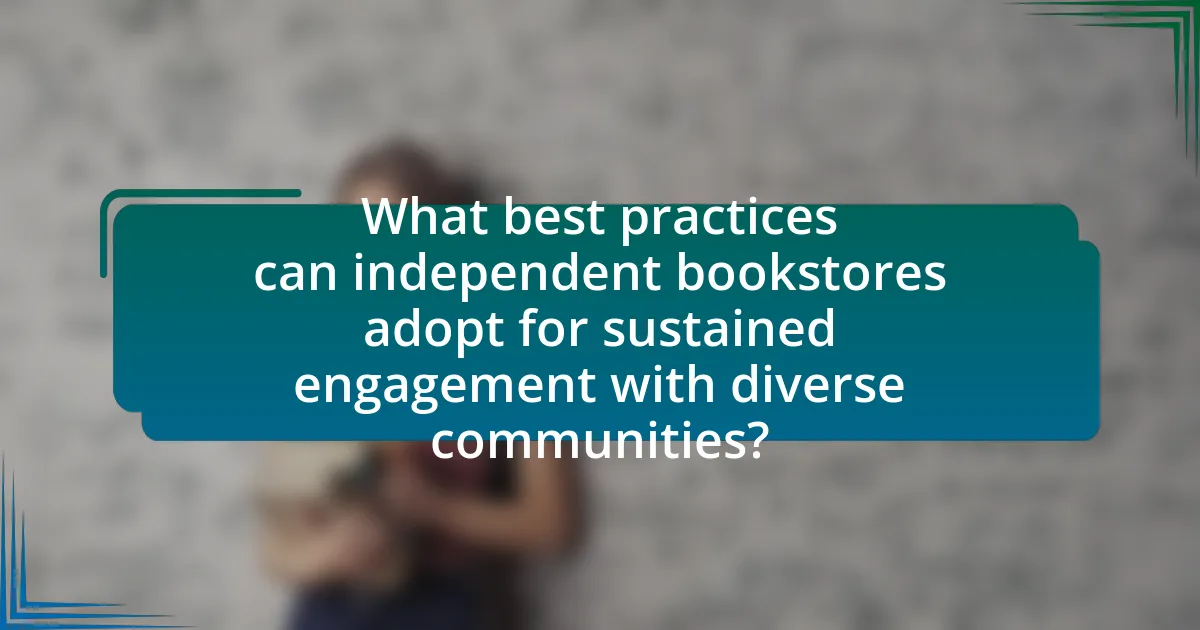
What best practices can independent bookstores adopt for sustained engagement with diverse communities?
Independent bookstores can adopt several best practices for sustained engagement with diverse communities, including hosting culturally relevant events, collaborating with local organizations, and curating diverse book selections. Culturally relevant events, such as author readings, workshops, and community discussions, create inclusive spaces that resonate with various cultural backgrounds. Collaborating with local organizations, such as schools, cultural centers, and nonprofits, can enhance outreach and foster community ties. Curating diverse book selections that reflect the interests and experiences of different communities not only attracts a broader audience but also promotes representation in literature. These practices are supported by research indicating that community engagement initiatives significantly increase customer loyalty and community support for local businesses.
How can independent bookstores measure the success of their engagement strategies?
Independent bookstores can measure the success of their engagement strategies through metrics such as customer foot traffic, sales data, and community feedback. By analyzing foot traffic, bookstores can determine how many customers visit during events or promotions, indicating the effectiveness of their outreach. Sales data, particularly during engagement initiatives, provides insight into whether these strategies translate into increased revenue. Additionally, gathering community feedback through surveys or social media interactions allows bookstores to assess customer satisfaction and identify areas for improvement. These methods collectively offer a comprehensive view of engagement success, supported by quantitative and qualitative data.
What metrics should be tracked to evaluate community involvement?
To evaluate community involvement, independent bookstores should track metrics such as participation rates in events, volunteer hours contributed, and customer engagement levels. Participation rates in events indicate how many community members are attending bookstore-hosted activities, reflecting interest and engagement. Volunteer hours measure the time community members dedicate to supporting the bookstore, showcasing their commitment. Customer engagement levels can be assessed through social media interactions, newsletter sign-ups, and feedback surveys, providing insights into how well the bookstore connects with its community. These metrics collectively offer a comprehensive view of community involvement and its impact on the bookstore’s success.
How can feedback from community members be effectively gathered and utilized?
Feedback from community members can be effectively gathered through structured surveys, focus groups, and social media engagement. Structured surveys allow for quantitative data collection, while focus groups provide qualitative insights into community needs and preferences. Social media engagement facilitates real-time feedback and fosters ongoing dialogue.
Utilizing this feedback involves analyzing the data to identify trends and actionable insights, which can then inform decision-making processes, such as inventory selection and event planning. For instance, a study by the American Booksellers Association found that bookstores that actively engage with their communities through feedback mechanisms see a 20% increase in customer satisfaction and loyalty. This demonstrates the importance of both gathering and utilizing feedback to enhance community engagement and bookstore success.
What ongoing initiatives can bookstores implement to maintain community relationships?
Bookstores can implement ongoing initiatives such as hosting community events, offering book clubs, and collaborating with local authors to maintain community relationships. These initiatives foster a sense of belonging and encourage local engagement. For instance, community events like readings, workshops, and cultural celebrations can attract diverse groups and create a welcoming atmosphere. Additionally, book clubs tailored to various interests can promote regular interaction among community members, enhancing social ties. Collaborating with local authors not only supports local talent but also draws their followers into the bookstore, further strengthening community bonds. Research indicates that bookstores that actively engage with their communities see increased customer loyalty and foot traffic, demonstrating the effectiveness of these initiatives.
How can independent bookstores create loyalty programs that appeal to diverse customers?
Independent bookstores can create loyalty programs that appeal to diverse customers by incorporating personalized rewards, culturally relevant events, and community engagement initiatives. Personalized rewards, such as discounts on genres or authors that reflect the interests of various cultural groups, can enhance customer satisfaction and retention. Culturally relevant events, like book signings with diverse authors or themed reading nights, foster a sense of belonging and community among different customer demographics. Additionally, engaging with local organizations and schools to promote literacy and cultural awareness can strengthen ties with diverse communities, making the bookstore a hub for cultural exchange and learning. These strategies are supported by research indicating that businesses that tailor their offerings to meet the specific needs of diverse populations see increased customer loyalty and engagement.
What role do book clubs and reading programs play in community engagement?
Book clubs and reading programs serve as vital tools for fostering community engagement by creating spaces for dialogue, connection, and shared experiences among diverse groups. These initiatives encourage individuals to come together, discuss literature, and explore various perspectives, thereby enhancing social cohesion. Research indicates that participation in book clubs can lead to increased civic involvement, as members often feel more connected to their community and motivated to engage in local issues. For instance, a study by the American Library Association found that libraries hosting reading programs reported higher levels of community participation and collaboration. This demonstrates that book clubs and reading programs not only promote literacy but also strengthen community bonds and encourage active citizenship.
What practical tips can independent bookstores follow to enhance their community engagement efforts?
Independent bookstores can enhance their community engagement efforts by hosting regular events such as book readings, author signings, and community discussions. These events foster a sense of belonging and encourage local participation, which is crucial for building relationships within the community. For instance, a study by the American Booksellers Association found that bookstores that actively engage with their communities through events see a significant increase in customer loyalty and foot traffic. Additionally, collaborating with local schools and organizations for literacy programs can further strengthen ties and promote reading among diverse populations.
